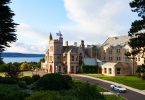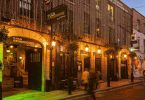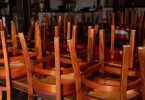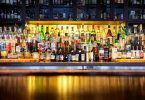David Hickey – “terrible lucky!”
Despite it being a busy Friday lunchtime in Limerick’s South’s Bar, former VFI President David Hickey, as always, makes time to see me. David was brought up in the trade and tells a fascinating tale of pub life down the years.
Born in Clonlara, his mother had run a pub before marrying David’s farmer father who died young when David was only 15. Leaving school to help run the traditional mixed trading pub and grocery (with petrol pumps), money was tight.
“In those days” David recalls, “everything went down in the book – ‘We were busy all day but we got no money’ my mother used to say.”
One day his uncle was told of a pub for sale in nearby Mongret.
As he’d no car himself (being only 15), David and his uncle took his mother out of a Tuesday in September 1959 to have a look at it. She bought it on Wednesday for £9,100, selling Clonlara for £5,300.
“We also sold 25 acres of land and an ‘outside farm’ down near Doonas with all road frontage for £1,800!” smiles David with a touch of rue.
The Hickeys had only settled into Mongret a few months when the local cement factory announced a significant expansion.
“1,000 people came to work there and we went from selling six timber kegs of stout a week to 40. We were terrible lucky,” he recalls with a somewhat less rueful smile, “Fellows earning £25 to £30 a week came on their bikes back from the factory; there could be 100 bicycles against the wall outside the door.
“After about six months, the £30 became £50 and they started buying Morris Minors and Anglias with the overtime.
“The minute the hooter would go on the factory, mother would instruct us: ‘Lads, start fillin’’ and we’d have some 50 pints filled from the draught tap.”
Large bottles of stout – ‘the Dano’ – were particularly popular as were flagons (2 pints) of cider from Bulmers in Clonmel at the time.
“In the Summer, you wouldn’t be able to supply enough of these. There would be war trying to get a couple of cases. And there was no ice or coldrooms back then.”
Then, barrels were kept in the yard. In Winter, they’d to keep one by the fire. As a child he well remembers the Guinness boats coming along the river with “ice-cold” barrels.
“They’d go into the kitchen to redden the poker and put it into the pint to bring up the temperature it was so cold.”
By 1972 he’d got married and decided to try working a small farm. It only lasted six months. He didn’t like it at all and returned to the trade.
In November of that year, South’s, “a real old famous Limerick name” came on the market in Limerick City, a pub he really wanted. His mother gave him her full support.
Paddy Downs, their local solicitor, used drink in Mongret. When he told Paddy of his wish to buy South’s, Paddy admonished the 28 year-old aspirant, “Sure that’ll make £45,000!”.
It was an astronomical sum but unpeturbed, they went to have a look at it before it went to auction the very next day. It failed to sell at £40,000.
“South wouldn’t sell it but the story appeared in the papers that South, a single man, was getting £40,000 for his pub and who was the madman giving this sum for that pub??”
A funeral at the time found everyone talking about ‘this madman’ but only he and his solicitor knew who the ‘madman’ was….
“The price went from £40,000 to £52,000 within a week as there was another man, a Carling Brewery manager, mad to buy it as well,” remembers David.
At this stage David was for pulling out, telling mother this but she told him not to pull out at this stage, instructing him to continue bidding. He still had 60 acres of land to sell as well as her backing.
The bidding had been going up in £500s so he offered £53,000 which, he hoped, would give a signal.
“I went into De Courcey’s – there were no mobile phones at that time – and raised the offer, telling them that if another bid came in I was finished.
“They phoned me back within an hour and I had the pub… I hadn’t even talked to the bank!”
When he took it over in November 1972 it had no central heating, indeed not even a ladies toilet, so among the first tasks he undertook was installing a ‘ladies’ and central heating (for which he got £7,000 more from the bank after which they bluntly informed him that he’d be getting no more).
The business took off with former locals from Mungret and Clonlara adding to the swell of customers. At that stage South’s was turning over £1,000 a week. No other pub in Limerick was doing that.
Over the intervening years many renovations have taken place including purchasing the adjacent flower shop and the removal of the off-licence.
“We were doing so well we didn’t need the off-licence,” he tells me today…
By 1986 interest rates had risen to 23 per cent. Things began to decline and money became very scarce “… and only for the help of my mother I’d probably have gone to the wall myself”.
Another refurbishment 10 years ago took out all the old snugs and installed a carvery counter.
While still managing a highly successful pub in South’s, David’s can claim to have witnessed many changes since he began in the trade.
“Back then, 80 per cent of people drank in the pubs and no drink was allowed on a Sunday, so I found myself at 12 years-of-age standing at the crossroads keeping an eye out for the Garda bicycle! On his approach, I’d knock on the window and — all out the back!”
Today, the problems on the immediate horizon are of a more sinister nature.
“I’m afraid that in the next month, when the Tax Clearance Certs are due, there’s going to be an awful lot of people without licences,” he says, “The basic costs in running a pub are the biggest threat as the disposable income that we had in the past isn’t there now.
“Whoever will survive this Tax Clearance Certificate issue will live on and survive, for there are still too many pubs in the country.”
With that, he takes his leave and turns back to help serve South’s ever-growing lunchtime throng of customers.
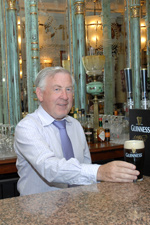
“South wouldn’t sell it but the story appeared in the papers that South, a single man, was getting £40,000 for his pub and who was the madman giving this sum for that pub??” – David Hickey



